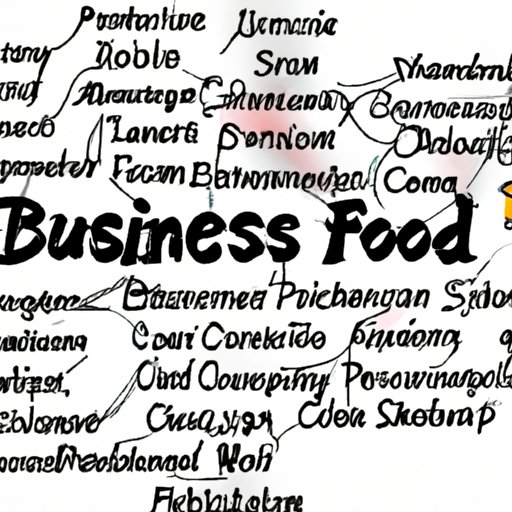Introduction
Starting a food business can be an exciting and rewarding venture. Whether you’re a chef looking to open a restaurant or a baker selling specialty products, there are many factors to consider when launching your business. From researching local laws and regulations to creating an effective marketing strategy, it’s important to understand the process of launching a successful food business.

Definition of a Food Business
A food business is defined as any business that produces, processes, distributes, or sells food. This includes restaurants, catering services, grocery stores, food trucks, and bakeries. According to a survey by the National Restaurant Association, there are over 1 million food and beverage establishments in the United States, employing over 14 million people.

Overview of Challenges and Opportunities in Starting a Food Business
Starting a food business can be a daunting task. It requires thorough research and planning, as well as a strong financial commitment. However, with the right approach, it can also be incredibly rewarding. According to a 2017 study by the US Census Bureau, nearly 36% of new businesses survive for at least 10 years. With this in mind, let’s take a look at the steps involved in starting a successful food business.
Research the Local Laws and Regulations Regarding Food Businesses in Your Area
Before you can launch your business, you need to understand the local laws and regulations regarding food businesses in your area. Every state and municipality has different requirements for food businesses, so it’s important to do your research. Speak to other food business owners in the area and consult with a lawyer to ensure that you comply with all applicable laws and regulations.
Identify the Necessary Licenses and Permits
Once you understand the local laws and regulations, you will need to obtain the necessary licenses and permits to operate your business. Depending on the type of food business you are starting, you may need a license from the health department, a permit from the zoning board, or both. Make sure to research the specific requirements for your area and apply for the necessary licenses and permits before opening your business.
Understand Any Restrictions or Regulations Regarding Your Business
In addition to obtaining the necessary licenses and permits, you should also make sure to understand any restrictions or regulations regarding your business. For example, some municipalities have restrictions on noise levels or limits on the number of customers allowed in your establishment. Understanding these regulations will help you stay compliant and avoid potential fines or penalties.
Develop a Business Plan with Clear Financial Goals and Objectives
Once you have a clear understanding of the local laws and regulations, it’s time to develop a business plan. A business plan is essential for any successful business, as it outlines your product/service offerings, financial goals, and strategies for achieving those goals. When writing your business plan, make sure to include detailed financial projections and a realistic timeline for reaching your goals.
Outline Your Product/Service Offerings
Your business plan should include a detailed description of your product/service offerings. What types of food will you be serving? Will you offer delivery or take-out? How much will your menu items cost? Answering these questions will help you create a plan for launching your business.
Establish Short-Term and Long-Term Financial Goals
In addition to outlining your product/service offerings, it’s important to establish clear financial goals. Outline both short-term and long-term goals, such as achieving a certain level of sales or expanding your business. These goals will serve as a roadmap for how to achieve success in the future.
Consider Potential Risks and Contingency Plans
No business is immune to risk, so it’s important to consider potential risks and develop contingency plans. Think about possible scenarios and how you would respond if they occurred. For example, what would you do if a major supplier went out of business? Having a plan in place will help you prepare for any potential risks.
Analyze the Competition to Identify How You Can Differentiate Your Business
Once you have a solid business plan in place, it’s time to analyze the competition. Take the time to research your competitors’ products and services to determine how you can differentiate your business. What sets your business apart from the competition? What unique products or services can you offer? Identifying your unique selling point will help you stand out from the crowd.

Secure Financing for Your Business
The next step is to secure financing for your business. There are several options available for financing, including bank loans, investor funding, and government grants. Consider the various options and decide which one best fits your needs. Once you’ve decided on a funding source, develop a pitch to present to potential investors.

Select a Suitable Location for Your Business
Once you have secured financing for your business, it’s time to select a suitable location. Take into consideration factors such as foot traffic, visibility, and zoning requirements. If possible, visit the location in person to get a feel for the area. Remember, the right location can make or break your business, so it’s important to choose wisely.

Design a Powerful Marketing Strategy to Reach Potential Customers
It’s not enough to simply select a suitable location; you also need to develop a powerful marketing strategy to reach potential customers. Determine your target audience and create an effective digital marketing strategy to reach them. Consider using social media, email marketing, and search engine optimization (SEO) to increase awareness of your business and attract new customers.
Create an Efficient Operational System for Running Your Business
Finally, you need to create an efficient operational system for running your business. Establish clear workflow procedures and invest in appropriate technology, such as a point-of-sale (POS) system or inventory management software. Implementing an efficient operational system will help you streamline your business and increase productivity.
Conclusion
Starting a food business can be an exciting and rewarding venture. With the right approach, you can turn your passion into a successful business. This guide provides aspiring entrepreneurs with tips on researching local laws, developing a business plan, selecting a location, and more. Keep these tips in mind as you embark on your journey as a food business owner.
(Note: Is this article not meeting your expectations? Do you have knowledge or insights to share? Unlock new opportunities and expand your reach by joining our authors team. Click Registration to join us and share your expertise with our readers.)
